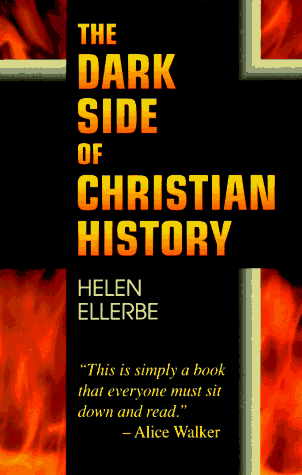Book review: The Dark Side of Christian History
by Helen Ellerbe
★★★
This is a rather discouraging look at Christianity through the last 20 centuries. The book’s value is not in the strength of its research (which is one-sided and sometimes shallow) but in its provocative imagery. You won’t forget it. “The Church had a devastating impact upon society,” Ellerbe insists at the beginning of chapter four as she dives into the dark ages. While historical atrocities such as the crusades and the Inquisition are indeed embarrassing to the Christian side of the ledger, one gets the sense from this book that Christianity is at the root of racism, illiteracy, poverty, plague, violence, slavery, and everything else wrong with the world.
Do not imagine you are reading a book about Christian faith; Ellerbe’s focus is on the human abominations done in the name of religion, not on its creeds or principles. We all know that the example Christ left was one of nonviolence. Ellerbe’s take is not that Christianity is evil in itself, but that monotheistic religion is flawed, and simply cannot produce positive results over the long haul. A monotheistic religion naturally leads humanity to the “dark side.”
Ellerbe’s bias is easily detectible. She does, however, make some intriguing points and provide some graphic examples, not least of which is the treatment of accused witches, whose emphasis within the book is probably no coincidence. Though not clearly stated (or so I didn’t notice), Ellerbe’s religious sympathies appear to lie that direction; she bemoans Christianity’s “alienation from nature.”
The horror of witch hunts knew no bounds, she says. “Sexual mutilation of accused witches was not uncommon. With the orthodox understanding that divinity had little or nothing to do with the physical world, sexual desire was perceived to be ungodly. When men persecuting the accused witches found themselves sexually aroused, they assumed that such desire emanated, not from themselves, but from the woman. They attacked breasts and genitals with pincers, pliers and red-hot irons.”
Read the book for an eye-opening overview of the topic, but with a little grain of salt.












 354 Circles
354 Circles
 603 Goodreads Friends & Fans
603 Goodreads Friends & Fans

 Hello! I'm an author, historical Jesus scholar, book reviewer, and liberal Christian, which means I appreciate and attempt to exercise the humanitarian teachings of Jesus without getting hung up on any particular supernatural or religious beliefs.
The Bible is a magnificent book that has inspired and spiritually fed generations for thousands of years, and each new century seems to bring a deeper understanding of life’s purpose. This is true of not only Christianity; through the years, our age-old religions are slowly transforming from superstitious rituals into humanitarian philosophies. In short, we are growing up, and I am thrilled to be riding the wave.
I avidly read all thought-provoking religion titles. New authors: I'd love to read and review your book!
Hello! I'm an author, historical Jesus scholar, book reviewer, and liberal Christian, which means I appreciate and attempt to exercise the humanitarian teachings of Jesus without getting hung up on any particular supernatural or religious beliefs.
The Bible is a magnificent book that has inspired and spiritually fed generations for thousands of years, and each new century seems to bring a deeper understanding of life’s purpose. This is true of not only Christianity; through the years, our age-old religions are slowly transforming from superstitious rituals into humanitarian philosophies. In short, we are growing up, and I am thrilled to be riding the wave.
I avidly read all thought-provoking religion titles. New authors: I'd love to read and review your book!
 Hi! While Lee writes the articles and reviews the books, I edit, organize, and maintain the blog. The views expressed here are Lee's but I'm his biggest supporter! :-)
Hi! While Lee writes the articles and reviews the books, I edit, organize, and maintain the blog. The views expressed here are Lee's but I'm his biggest supporter! :-)
As someone that has studied history, the Dark Ages, the era of Emperor Constantine, the beginning of The church era, before reading this book, most if not all is supported through history. Why is it that most non-christians are aware of our world’s history and the history of Christianity itself than those that practice it? Perhaps the same fear that prevents them from going astray from their own religion. The same fear that was used in the infancy of Christianity to scare people into converting from Pagan ways? The same fear used by an Emperor whom himself wasn’t Christian until his deathbed, used to rule Europe without dissidence. Research the life of Emperor Constantine, he was a key factor in developing Christianity, in making it the dominant religion in Europe, in determining to use Mirtha’s birth, and the Pagan celebration of Winter Soltice as Christ’s official birthday. Also look at how he punished all those that did not accept Christianity.
Ah, good old Constantine, now THERE’S a character who has created a bit of controversy! Thanks for contributing, Bob!